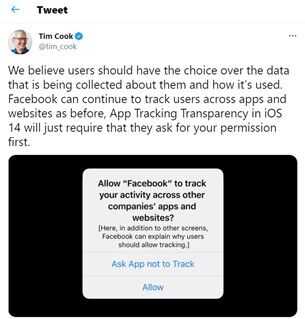Does Personalised Promoting Perform? | Psychology Today
4 min read
Iphone Has New Privateness Controls
Resource: Tracy Le Blanc/Pexels

Tim Cook dinner tweets
Supply: RE Petty
[By Joe Siev and Richard Petty].
Apple’s
new working method
for its well-known Iphone makes it easier for persons to stay away from becoming tracked by companies that want to provide personalised messages. Customized promoting can vary from receiving an unsolicited letter, e mail, or textual content dealt with to you by title to a very targeted banner advert dependent on your latest on the internet lookup record.
In today’s digital economic system, adverts commonly use behavioral info (our clicks when world wide web surfing) to identify and target us in many strategies including by our gender, race, and even individuals sneakers we searched for this early morning. For world wide web buyers, this variety of personalization is everywhere.
Surveys show that numerous individuals
have reservations
about specific advertising and marketing that may possibly result in them to stay away from these kinds of ads and resist their impact. Supplied how common customized advertising and marketing has turn out to be, just how inclined to influence are we?
To improved comprehend people’s responses to individualized promoting,
our research group
at Ohio Condition University a short while ago reviewed many years of psychology and shopper habits study studies on the efficiency of diverse sorts of personalization for changing consumers’ attitudes and behavior. The
critique
is printed in the
Journal of Purchaser Psychology.
As it turns out, while customized promoting
can be helpful
, it is not usually effective and can even backfire. In this article are some issues for skeptical people to be knowledgeable of when it will come to personalization.
What Is Personalized Matching?
Our review included various sorts of personalized matching — when marketers tailor elements of their concept, the source providing the message, or the setting in which the concept is been given, to be appropriate with some element of the recipient.
For example, in a
traditional examine
it was proven that emphasizing the rewards of a item for one’s social picture is typically effective for people who care about earning a superior effect on other people, but emphasizing products high quality is a greater bet for shoppers who care a lot less about their graphic. Below, the information itself matches the recipient’s objectives (i.e., a concept-to-receiver match).
Illustrations of source-to-receiver matching incorporate
displaying
that a Republican politician has much more achievement than a Democrat in persuading Republican voters to assist a policy (and vice versa), and that
strong
(vs. very low electricity) resources are extra persuasive to effective (vs. small electricity) recipients (and vice versa).
Personalization can also choose the variety of a setting-to-receiver match. For instance, leisure consumers tend to favor stimulating and immersive on the net shopping experiences, while utilitarian buyers come across these attributes distracting and favor a straightforward, useful consumer experience.
When Does Personalised Matching Backfire?
Our overview of the many experiments on personalized matching strengthened the check out that it is usually effective for entrepreneurs. Having said that, we also located cases when personalized matching truly lowered the ad’s affect mainly because buyers interpreted the match negatively. These backfire effects tumble into five classes:
- Invasion of privacy. The most obvious way matching backfires is when buyers believe that marketers obtained or are applying personalized info they thought was or should be non-public. Buyers with issues about facts privacy are relatively resistant to matching consequences, whilst they may be extra open up to it when providers get hold of consent to obtain and use their information.
- Attempt at manipulation. Matching backfires if shoppers feel entrepreneurs are trying to management or manipulate them in some way. The most advertising savvy people are especially resistant to manipulation. Therefore, discovering about the psychology of persuasion can assist shoppers defend them selves.
- Unfair or stereotypic judgment. Matching backfires when shoppers check out an advert as focusing on them dependent on an unfair or stereotypic judgment about them, this sort of as about their gender identification, age, race, or bodyweight. Invasiveness, manipulation, and stereotyping really should be averted for apparent moral good reasons. But from time to time matching is ineffective only because buyers find it to be irritating.
- Currently recognised written content. Matching can make customers tune out the concept by signaling that they now know what marketers want to explain to them (e.g., concentrating on superfans of a musician with very well-publicized information and facts about the musician’s future album). Shoppers with potent views about the matched content are especially probably to understand it as presently identified to them.
- Weak arguments. Occasionally matching increases considering about the ad which is fantastic when the advertisement is compelling, but can backfire when the ad can make an unconvincing scenario.
Conclusions
Specific promoting has arrive
underneath fire
just lately, with some going so significantly as to connect with for an outright
ban on the observe
. No this kind of bans are on the horizon, however, even though some corporations, like Apple, are earning it less difficult for consumers to stay clear of being tracked. While marketers’ have moral obligations to defend consumers’ information and avoid manipulative methods, shoppers can assistance defend themselves by way of an educated technique to the psychology of individualized matching.
References
Teeny, J.D., Siev, J.J., Briñol, P., & Petty, R. E. (2021). A critique and conceptual framework for knowing customized matching effects in persuasion. Journal of Buyer Psychology. DOI: 10.1002/jcpy.1198






